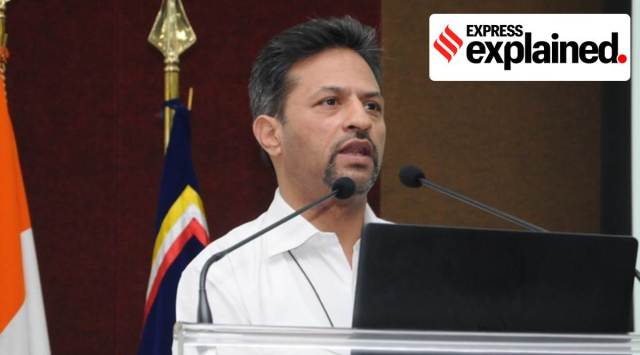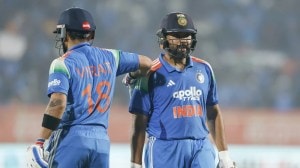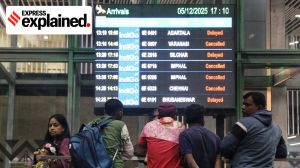Row over Nagaland DGP: How are state police chiefs appointed?
Appointments of DGPs are now made on the basis of the Supreme Court judgment on police reforms in Prakash Singh vs Union of India 17 years ago. So what is the process, and how closely is it followed?
 Rupin Sharma (Source: LinkedIn)
Rupin Sharma (Source: LinkedIn) The Nagaland government on Saturday issued an order appointing Rupin Sharma as Director General of the state police, and relieved him of the charge of Home Guards and civil defence.
On January 23, the Supreme Court had directed the Nagaland government to appoint the 1992-batch IPS officer as police chief within a week. The order was passed after Nagaland challenged the Union Public Service Commission’s (UPSC) recommendation of Sharma as the only candidate for the post.
How did this situation arise?
Nagaland’s previous DGP, T John Longkumer, was due to retire in August 2022, but the Union Home Ministry gave him a six-month extension, allowing him to remain in office beyond the date of his superannuation. Following a legal challenge by a students union, the Supreme Court asked the state to send a panel of eligible officers for the post to the UPSC.
The state’s list had Sharma and A Sunil Achaya, an officer of the 1991 batch of the IPS. But Achaya, an additional secretary in the Cabinet Secretariat, was unwilling to return to his parent cadre, so the UPSC sent only Sharma’s name to Nagaland for consideration. Sharma alone met the criterion of a minimum 30 years of service, the UPSC said.
The state objected, arguing that the Supreme Court had said in the Prakash Singh judgment (2006) that the panel must have at least three officers — and UPSC must therefore reduce the service length criterion to 25 years (so that more officers become eligible).
However, the SC ruled in favour of UPSC, saying this could create a situation in which a senior officer is forced to function under an officer five years junior to him. It also said that the stipulation of three officers in the panel was not sacrosanct.
What did Prakash Singh say?
Appointments of DGPs are now made on the basis of the Supreme Court judgment on police reforms in Prakash Singh vs Union of India 17 years ago. According to the SC’s guidelines on the appointment of police chiefs, the DGP is to be selected by the state government from among the three senior most officers who have been empanelled for promotion to that rank by the UPSC “on the basis of their length of service, very good record and range of experience for heading the police force”.
The DGP should have a fixed tenure of two years in the post, irrespective of the date of retirement. A DGP can be removed only in exceptional circumstances.
So what is the process of appointment?
Based on the judgment, the UPSC issued its own guidelines in 2009 on the appointment of police chiefs of states. According to these guidelines, states are supposed to draw up and send to the UPSC a list of eligible officers with at least 30 years of service behind them, along with these officers’ service record, performance appraisal, and vigilance clearance.
These officers are to be of the rank of ADG or the rank of police chief (and one below) stipulated for that state. The list is supposed to be given to UPSC six months before the incumbent DGP is to retire.
An empanelment committee headed by the UPSC chairman, and with the union home secretary, state chief secretary, state DGP, and the chief of a central police organisation in it, is supposed to select a panel of three officers “based on merit”. For smaller states that may have only one cadre post of DGP, the committee is supposed to send two names.
In the case of Nagaland, only two officers fulfilled the criteria of 30 years of service. One among these officers pulled out, so only one officer’s name was sent to the state. Interestingly, while the UPSC submitted that Achaya had pulled out of the race, the Home Ministry in its affidavit said Achaya could not be relieved as he was shouldering an important responsibility at the Centre.
Under the rules, consent of an officer is not required for her posting. Also, the Centre has the power to not relieve an officer for posting in the state.
UPSC also submitted that while the 30-year rule could be relaxed to 25 years in states like Himachal Pradesh, Manipur, Nagaland, Uttarakhand, Tripura, and Sikkim which may not have enough officers meeting this criterion, this is to be done with the consent of the Centre.
Through two orders passed in 2018 and 2019, the SC has also stipulated that the UPSC shall not put in the panel any officer with less than six months to retirement.
How closely is this system followed?
Sources said that while the SC has said there must be no temporary or ad hoc appointments of police chiefs, at least four states currently have interim chiefs.
In Nagaland, former DGP Longkumer had to quit midway in his extended tenure only after a petition was filed in the court.
In Delhi, S N Srivastava, who was appointed commissioner of police in 2020, spent almost his entire tenure in interim status, and was succeeded by an interim commissioner.
The Centre has used the Prakash Singh judgment selectively. In 2021, it rejected the candidature of Rakesh Asthana and Y C Modi as CBI Director on the ground that they had less than six months to go for retirement, but appointed Asthana as commissioner of Delhi Police a day before his retirement.
So does the process of appointment itself carry the seeds of disputes such as the one involving DGP Rupin Sharma?
Sources in the police establishment said UPSC had no option in the Rupin Sharma case given that only two officers were eligible; however, problems often arise because the UPSC has of late relied mainly on seniority to draw up the panel of officers.
The Prakash Singh judgment made it clear that UPSC must prepare the panel based on seniority, service record, and range of experience. The SC has also repeatedly emphasised on “merit” as the basis of appointment.
“If a state has given a list of, say, a dozen officers, it may not be the case that they think that just the three most senior among them are fit for the job. There may be more meritorious officers below them in the list. If only the three most senior officers are to be chosen, the expertise of the UPSC panel is not required at all. The state can do it on its own,” a senior official said.
Sources said the exit of UP DGP Mukul Goel in May 2022, just 10 months after his appointment, was a result of the state-Centre friction. The state was given a list of three officers (according to seniority) and Goel had to be chosen out of it. The state, sources said, believed there were officers more meritorious below those mentioned in the list. Finally, Goel was removed for “disregarding official work”, much to the embarrassment of the officer.
But this has not been the case at all times.
In 2019, the appointment of IPS officer Dinkar Gupta, who is now the chief of the National Investigation Agency (NIA), as Punjab DGP was challenged in the court by those senior to him, one among them being IPS officer Mohd Mustafa. The UPSC then defended its decision on the grounds of “merit” over “seniority”. It argued that it had prepared the panel judging the officers on five parameters of policing based on “very good service record and range of experience”. The state argued that Gupta fared the best on those indices.
The Supreme court rejected the challenge of Mohd Mustafa, holding that “the appellant was found to be inadequate for inclusion in the panel in the range of experience for core policing areas” despite being senior.
Prakash Singh, the former UP DGP and police reforms crusader, told The Indian Express: “UPSC is not discharging its duty up to expectations. It appears they are vulnerable to pressures from interested quarters.”
- 01
- 02
- 03
- 04
- 05






































